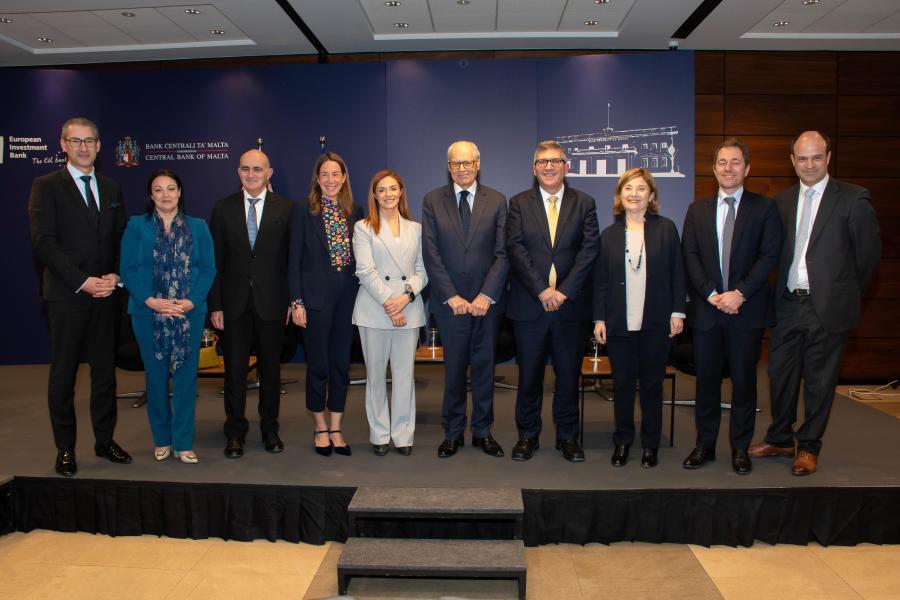
The Central Bank of Malta (CBM) and the European Investment Bank (EIB) co-hosted a conference on EIB investment towards the green, digital and energy transition in small states at the Central Bank of Malta in Valletta on Friday 15 March 2024. The conference focused on the financing of the triple transition in small states: how best to finance the green, digital, and energy transitions, with an emphasis on the specific challenges faced by small states.
Central Bank of Malta Governor Professor Edward Scicluna opened the conference. His speech was followed by an address from EIB Vice-President Gelsomina Vigliotti, who said: “Small island states bear the brunt of climate change impacts, facing disproportionate challenges and threats. As the EU climate bank, the EIB is fully committed to aiding Malta in reducing its vulnerability to climate shifts by backing projects that contribute to curbing pollution, promote energy efficiency, and drive the development of disruptive technologies crucial for fostering a sustainable economy.”
The Minister for Energy, Environment and Regeneration of the Grand Harbour Miriam Dalli delivered the keynote speech of the conference. In her address, Minister Dalli emphasised the fact that the triple transition — comprising the green, digital, and energy transformations — is a set of objectives guiding us towards sustainability, innovation and resilience. “The green transition, the digital transition and the energy transition will enable Malta to pave the way for a better economy, society and environment for our generation and those who come after us. Malta is fully committed to this transition — not solely due to international obligations but also because this government has consciously chosen to lead this change,” she said.
EIB Chief Economist Debora Revoltella presented the main results from the latest EIB Investment Survey. The survey offers unique insights on the corporate investment landscape, in particular regarding firms' investment priorities and the constraints they face. “This year’s edition shows that Maltese businesses are increasingly aware of the challenges posed by climate change and energy shocks and are taking proactive measures in response. There is visible progress in the adoption of advanced digital technologies such as digital platforms, drones, and big data and artificial intelligence. However, there is scope for further investment in energy efficiency measures and for supporting the development of climate adaptation strategies which, alongside addressing skill shortages, would enhance the development of green investments. Prioritising access to finance and deploying catalytic instruments can play a pivotal role in transforming the economy and boosting competitiveness.”
Economists Warren Deguara and Erica Brincat from the Central Bank of Malta’s Economic Analysis Department presented — for the first time — some of the results of a new survey that the bank conducted among non-financial corporates (NFCs). The survey seeks to assess Maltese firms’ awareness of issues surrounding the impact of climate change and the risks this poses for their activity. The survey also delves into the possible impact that mitigation policies may have on local firm operations, as well as the investment both in physical and human capital that will be required to aid in transitioning towards carbon neutrality. The survey shows that firms believe that the general environmental awareness in Malta still needs to improve. However, most firms agree that climate change and related mitigation policies will accelerate the take up of new and cleaner technologies.
A panel discussion chaired by the Malta Council for Economic and Social Development (MCESD) Chairperson David Xuereb entitled Financing of the transitions — opportunities and challenges of Malta followed. The panellists included EIB Adriatic Sea Department Director Gilles Badot, Country Coordinator for Malta Carlos Maravall Rodriquez, Malta Development Bank Chief Executive Officer Paul Azzopardi, APS Bank Chief Executive Officer and Chairman of the Malta Bankers Association (MBA) Marcel Cassar, and The Malta Chamber Chief Executive Officer Marthese Portelli.
Commenting on the conference, Professor Scicluna stated: “The potential of small states in contributing to global challenges is large thanks to their faster transformative potential. Cooperation with international institutions and other countries is however essential to yield results that can be replicated elsewhere, at scale.”
- A recording of the conference will be available shortly.
- The EIB Investment Survey — Malta overview is available here.
Background information
European Investment Bank (EIB)
The European Investment Bank (EIB) is the long-term lending institution of the European Union owned by its Member States. It provides long-term financing for sound investments that contribute to EU policy. The Bank finances projects in four priority areas: infrastructure, innovation, climate and environment, and small and medium-sized enterprises (SMEs).

©EIB
Download original

©EIB
Download original

©EIB
Download original